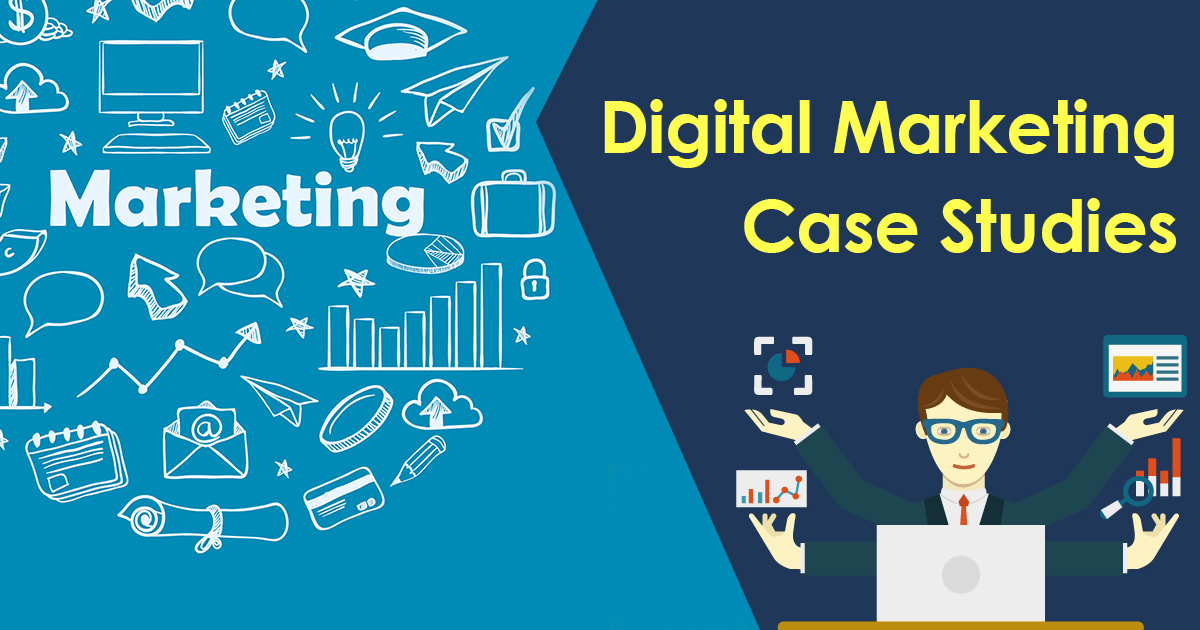
In the ever-evolving IT industry, innovation doesn’t stop at the product level—it extends to how companies market and communicate their value to the world. As traditional marketing channels lose their effectiveness, IT brands are increasingly turning to digital marketing strategies to drive brand awareness, generate qualified leads, and improve return on investment. But what does digital marketing success actually look like in the IT sector?
In this post, we explore real-world case studies of IT companies that successfully used digital marketing to solve key business challenges and achieve measurable growth. From B2B SaaS to global tech giants, these examples will provide actionable insights and proven tactics that any tech marketer can apply.
Let’s face it—marketing in the IT world is no cakewalk. You’re dealing with long sales cycles, niche audiences, and highly technical products. Yet, some IT companies have figured it out. They’ve cracked the digital marketing code and are using it to build trust, generate leads, and scale their business like never before.
So, how are they doing it? In this blog, we’ll break down real-life digital marketing campaigns from IT brands like IBM, Cisco, and Zoho. These aren’t just theoretical strategies—they’re real case studies that show what works and why. Whether you’re a digital marketer, tech founder, or agency partner, this is the inspiration you’ve been looking for.
According to recent research, over 68% of B2B tech buyers start their purchasing journey with an online search. In such a competitive landscape, having a well-executed digital marketing strategy isn’t just beneficial—it’s essential. IT companies that succeed in the digital space often do so through a combination of search engine optimization, content marketing, paid campaigns, and targeted outreach.
This blog post explores a curated set of successful digital marketing case studies from leading IT companies. Each one reveals how these businesses leveraged different channels and tactics to solve real problems, from lead generation to brand positioning. Whether you’re building a new campaign or optimizing an existing one, these stories will serve as a blueprint for success.
Digital transformation has changed how IT companies sell, communicate, and grow. In this new digital economy, companies that master online marketing gain a massive competitive edge. But while strategy is important, execution is everything—and nothing illustrates execution better than a powerful case study.
In this post, we highlight successful digital marketing campaigns from IT firms that used creativity, data, and strategy to achieve outstanding results. You’ll discover what made their approaches work, what tools they used, and how they measured success. If you’re ready to take your IT marketing strategy to the next level, these examples are your starting point.
Are you curious about how digital marketing really works in the tech industry? You’ve probably heard about SEO, social media ads, email marketing, and content—but how do IT companies actually use them in the real world? The best way to learn is by looking at successful examples.
In this blog, we’ll walk you through real case studies from the IT sector that show how companies applied digital marketing strategies to grow their business. Whether you’re a student, intern, or marketing newbie, these case studies will help you understand how theory turns into practice—and success.
Table of Contents
Sr. Headings
1) Introduction
2) Why Digital Marketing Matters for the IT Sector
3) Case Study 1: IBM – Leveraging Content Marketing for B2B Lead Generation
4) Case Study 2: HubSpot – Inbound Marketing that Converts
5) Case Study 3: Infosys – Using LinkedIn for Brand Awareness
6) Case Study 4: Cisco – Video Marketing for Global Engagement
7) Case Study 5: Zoho – SEO Strategy to Drive Organic Growth
8) Key Takeaways from These Campaigns
9) Conclusion
10) Frequently Asked Questions (FAQs)

Introduction
Marketing in the IT sector poses a unique set of challenges—complex solutions, technical jargon, long decision-making cycles, and a highly knowledgeable target audience. Traditional marketing approaches often fall short, making digital marketing the most effective and scalable option for IT brands looking to make a real impact. But succeeding in this competitive space takes more than just running ads or posting blogs.
In this article, we dive into real-world case studies where IT companies overcame these challenges with smart, strategic digital marketing campaigns. If you’re struggling to connect with your audience or generate consistent leads, these examples could provide the answers you’ve been searching for.
What do industry leaders like Cisco, IBM, and Zoho have in common—beyond world-class tech products? They all mastered the art of digital marketing. In a world driven by innovation and fast-changing algorithms, staying visible and relevant requires more than great technology; it demands powerful marketing.
This blog highlights inspirational case studies from IT companies that leveraged digital tools to build stronger brands, increase customer acquisition, and deliver a clear return on investment. These success stories prove that even the most complex B2B products can be marketed effectively with the right digital strategy.
If you work with IT clients, you know that marketing in this space is no walk in the park. Between explaining technical products, generating qualified leads, and aligning with long buying journeys, your strategies need to be laser-focused. Fortunately, some campaigns have set benchmarks for how digital marketing can be done right in the IT world.
In this blog, we unpack case studies that showcase high-performing digital strategies tailored for tech companies. Whether you’re an agency, freelancer, or digital marketing consultant, these examples offer insight into what’s working—and how you can replicate similar success for your own IT clients.
For decision-makers in the IT industry, the priority is clear: investing in marketing strategies that produce measurable ROI. But while digital marketing holds immense potential, not all campaigns deliver tangible business outcomes.
In this post, we analyze real-life case studies where digital marketing delivered powerful results for IT companies—boosting brand visibility, increasing conversions, and reducing customer acquisition costs. If you’re an executive evaluating your company’s marketing direction, these examples demonstrate the kind of impact the right strategy can achieve.
Digital marketing in the IT sector has become a game-changer, helping companies boost search engine rankings, generate qualified B2B leads, and improve online visibility. With increasing competition in the tech industry, mastering SEO, PPC, and content marketing is now essential for sustainable growth.
This article features top digital marketing case studies from the IT sector that highlight how leading tech companies use SEO strategies, social media campaigns, and marketing automation to reach their goals. Learn what tactics work best and how to apply them to your own IT marketing initiatives.
Why Digital Marketing Matters for the IT Sector
Unlike B2C marketing, the IT sector often targets niche B2B audiences, decision-makers, and long buying cycles. This makes digital marketing, with its ability to track, personalize, and scale campaigns, a key growth lever. IT companies use a blend of:
1) SEO for visibility
2) PPC for quick traffic
3) Content marketing for thought leadership
4) Social media for brand awareness
5) Email marketing for nurturing leads
Let’s now explore some real-world case studies that exemplify success in these areas.
The Digital Shift in IT Buyer Behavior
Over the last decade, the way people research and purchase IT solutions has changed drastically. Decision-makers no longer rely solely on traditional vendor meetings or trade shows to evaluate technology partners. Instead, they begin their journey online—conducting searches, reading reviews, comparing solutions, and consuming educational content. Digital marketing positions IT companies where their prospects are: on search engines, social media platforms, and email inboxes. It’s no longer just an add-on—it’s a necessity.
Complex Solutions Require Educational Content
IT products and services are often highly technical and complex. Whether it’s SaaS, cloud infrastructure, or cybersecurity solutions, potential customers must first understand how the product works and why they need it. That’s where digital content marketing plays a crucial role. Blog posts, white papers, explainer videos, and webinars help break down complicated concepts into digestible content—building trust, authority, and brand credibility in the process.
Long Sales Cycles Demand Nurturing
Unlike fast-moving consumer goods, IT sales cycles are long and involve multiple stakeholders. A digital marketing funnel—consisting of lead magnets, email campaigns, and remarketing ads—helps nurture leads over time. This consistent engagement builds relationships, answers objections, and keeps your brand top-of-mind when the buying decision is finally made. Without digital channels, many IT companies risk losing leads before they’re sales-ready.
SEO Helps Capture High-Intent Leads
Search engine optimization (SEO) is particularly effective in the IT sector, where buyers are actively researching solutions before making contact with a vendor. A well-optimized website that ranks for key industry terms can attract highly relevant, high-intent traffic at scale. More importantly, it captures interest when buyers are already in the consideration phase—making conversions more likely and shortening the sales cycle.
Paid Advertising Offers Scalable Reach
While organic strategies are essential, paid campaigns provide scale, speed, and targeting precision. Whether it’s Google Ads for targeting intent-based searches or LinkedIn Ads for reaching B2B decision-makers, paid media allows IT brands to generate qualified leads at a predictable cost. Digital marketing empowers IT companies to experiment, iterate, and optimize campaigns in real time—maximizing their ROI and reducing waste.
Data-Driven Insights for Smarter Decision-Making
One of digital marketing’s biggest advantages in the IT space is measurability. Analytics tools provide detailed insights into what’s working, what’s not, and where to improve. From website traffic sources to email open rates and conversion tracking, every touchpoint can be measured. This data-driven approach aligns well with the IT industry’s affinity for logic, analysis, and continuous improvement.
Enhancing Brand Authority and Thought Leadership
In a competitive market where products can seem similar, brand perception matters. Digital marketing helps IT companies differentiate themselves by showcasing expertise and thought leadership. Publishing high-value blog posts, contributing to industry forums, appearing in webinars, or launching podcasts positions your company as a go-to authority. This thought leadership translates to trust—a critical factor in long-term client relationships.
Global Reach, Local Impact
IT services often operate on a global scale, and digital marketing is the perfect vehicle for that kind of reach. With SEO, social media, and geo-targeted advertising, an IT company can connect with clients from San Francisco to Singapore. At the same time, local SEO and region-specific campaigns allow them to dominate in niche markets or specific locations—ensuring both breadth and depth of market presence.
Cost-Effective Lead Generation
Compared to traditional methods like trade shows, cold calls, or print advertising, digital marketing is far more cost-effective. It allows IT companies to target specific buyer personas, filter out unqualified leads, and allocate budget toward high-performing campaigns. This precision ensures that every dollar spent goes toward generating ROI—and helps smaller IT firms compete with larger players.
Building Communities and Engaging Users
In today’s landscape, companies aren’t just selling products—they’re building ecosystems. Digital platforms such as LinkedIn, Reddit, GitHub, and Slack allow IT firms to create communities around their solutions. Active engagement on these platforms boosts user retention, generates user-generated content, and opens new feedback loops—all of which contribute to a stronger, more sustainable business.
Keeping Up With Agile Competitors
IT is a fast-paced industry where innovation never sleeps. Startups and agile competitors are quick to adopt the latest marketing trends—whether it’s AI-generated content, programmatic advertising, or hyper-personalization. To remain competitive, established IT firms must also embrace digital marketing’s rapid evolution. Failing to do so risks becoming invisible in a market where attention is currency.
Supporting Product Launches and Updates
Product rollouts and feature updates are central to the IT business model. Digital marketing provides the perfect launchpad—through email blasts, landing pages, social media teasers, influencer collaborations, and video demos. A well-coordinated campaign ensures that new updates reach the right audience at the right time, creating excitement and accelerating adoption.
Leveraging Marketing Automation for Scale
Tools like HubSpot, Marketo, and Mailchimp allow IT marketers to scale their efforts without sacrificing personalization. Automated workflows can onboard leads, score prospects, and trigger nurturing sequences—saving time while improving conversion rates. For IT firms that are growing fast, automation makes it easier to stay efficient and consistent across all customer touchpoints.
Aligning Marketing with the Buyer Journey
Digital marketing allows IT companies to create targeted campaigns that align with each stage of the buyer journey—from awareness to decision. For example, blog content educates top-of-funnel visitors, case studies build trust in the middle of the funnel, and demo videos convert bottom-of-funnel leads. This strategic alignment ensures that prospects get the right message at the right time—improving both user experience and campaign results.
Future-Proofing Your IT Brand
As Gen Z and younger Millennials enter decision-making roles, the importance of digital-first branding will only increase. These digital natives expect seamless online experiences, personalized content, and rapid response times. Companies that invest in digital marketing today are positioning themselves to remain relevant and preferred as the next generation of tech buyers emerges.
Case Study 1: IBM – Leveraging Content Marketing for B2B Lead Generation
Challenge: IBM needed to position itself as a thought leader in AI and cloud computing while generating qualified B2B leads.
Strategy:
IBM created “IBM Think Blog”, which delivered high-quality, educational content targeting enterprise buyers. They combined whitepapers, case studies, and videos with smart SEO strategies.Result:
1) 30% increase in organic traffic- 2) 4x more inbound leads from content
- 3) Improved brand perception in key markets
Case Study 2: HubSpot – Inbound Marketing that Converts
Challenge: As a marketing automation software provider, HubSpot needed to showcase its own expertise in digital marketing.
Strategy:
HubSpot executed a robust inbound marketing campaign using blogs, free tools, email automation, and gated eBooks to convert visitors into leads.Result:
1) 15M+ monthly blog views- 2) Over 1M leads from gated content
- 3) Became a benchmark in inbound marketing
Case Study 3: Infosys – Using LinkedIn for Brand Awareness
- Challenge: Infosys wanted to increase its brand presence among enterprise clients and attract top tech talent.Strategy:
Infosys launched a LinkedIn video storytelling campaign that showcased behind-the-scenes innovation and leadership interviews. They also promoted thought leadership content on the platform.Result:1) 3x growth in LinkedIn followers
2) Significant boost in engagement rate
3)Enhanced employer branding
Case Study 4: Cisco – Video Marketing for Global Engagement
Challenge: Cisco aimed to explain complex networking solutions to a global, non-technical audience.
Strategy:
Cisco used video marketing to simplify its offerings through engaging animations and case demonstrations on platforms like YouTube, LinkedIn, and Twitter.Result:
1) 6M+ views across video content- 2) Increased product demo engagement by 40%
- 3) Global reach in over 30 countries
Case Study 5: Zoho – SEO Strategy to Drive Organic Growth
Challenge: Competing with giants like Salesforce, Zoho needed to stand out in search results and attract SMB customers.
Strategy:
Zoho implemented an aggressive SEO content strategy—targeting long-tail keywords, optimizing product pages, and building backlinks.Result:
1) 300% increase in organic traffic in 18 months
2) High rankings for competitive SaaS keyword
3) Lower customer acquisition cost
Key Takeaways from These Campaigns
- Content is still king: High-value content builds trust in the IT sector.
- Video drives engagement: Visual content simplifies complex offerings.
- Social platforms matter: Especially LinkedIn for B2B visibility.
- SEO builds long-term growth: It’s an essential low-cost channel.
- Personalization works: Email workflows and gated content improve lead quality.


Digital marketing enables IT companies to educate audiences, build trust, and generate leads in a cost-effective and scalable way.
A combination of SEO, content marketing, email automation, and LinkedIn marketing is highly effective for B2B IT firms.
Success is measured using KPIs such as website traffic, lead generation, conversion rates, cost-per-lead (CPL), and ROI.
Complex products, long sales cycles, and targeting C-suite decision-makers make it challenging—but not impossible—with the right strategy.
LinkedIn, Google Search, YouTube, and B2B communities like Reddit and Quora are commonly used.
Conclusion
These case studies prove that with the right digital strategy, IT companies can break through the noise, generate qualified leads, and build a global presence. Whether you’re a startup or an enterprise-level tech firm, adopting a customer-first, data-driven digital marketing approach can drive measurable success.
OCP Academy
(A Unit of OCP Foundation)
Learning Today, Leading Tomorrow

